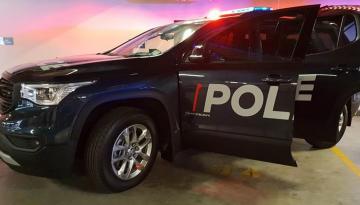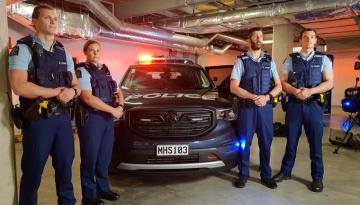A new survey shows an overwhelming majority of Māori and Pasifika whānau don't feel safe having Armed Response Teams or ARTs patrolling their communities.
Action Station has just released the results from 1155 Māori and Pasifika people who took part in the Perspectives on the Armed Police Trial survey.
Eighty-five percent of those surveyed did not support the trial going ahead, 87 percent felt less safe knowing there were armed police in their community and 91 percent would not call the police for help if they knew they had guns on them.
The survey results comes as Police commissioner Mike Bush announced this week the ARTs pilot would come to an end at the end of April and will be suspended until a review is completed.
Action Station director Laura O'Connell Rapira says the results are not surprising, and so far ARTs are not being used for high-risk armed situations and events.
"[ARTs] are being used mostly for ordinary routine traffic stops for ordinary people - patrolling brown and low income neighbourhoods."
O'Connell Rapira said the survey was driven by the lack of consultation by Police with Māori and Pasifika communities.
ARTs are sets of three Armed Offenders Squad members with a specialist vehicle equipped and guns. They were deployed last year and are currently being trialed in Counties Manukau, Waikato and Canterbury.
Last month lawyer Julia Whaipooti filed an urgent Waitangi Tribunal claim about the failure of Police to consult with Māori about the ART's pilot.
"Our concern is that arming police is a step into putting into policy... weapons in the arms of police that say our lives don't matter - Māori lives don't matter."
Whaipooti says police are nine times more likely to use guns against Māori and Pasifika people.
The 2007 Urewera Raids and the huge numbers of police used during the peaceful resistance at Ihumātao last year are some recent events which heightened distrust in the police.
"There's a historical distrust from Māori to police and arming an agency that we don't have high trust in that's going to create even more anxiety amongst our people."
Whaipooti says it's more than just about racism in the police system.
"It's about a question of our lives and why are shifting towards the Americanisation of our police - it hurts Māori the most."
O'Connell Rapira believes lessons need to be taken from Government's response to COVID-19 when it comes to the use of ARTs.
She says the COVID-19 response shows it is entirely possible to take bold swift and radical action to fundamentally change our system.
"[ARTs] could lead to the deaths of people in our whānau - and it doesn't have to happen if they choose differently."
O'Connell Rapira says instead of militarising police to raise even more fear amongst Māori more effort is needed to find meaningful solutions. She says Māori women are three times likely to be killed by their partner - and this won't improve with ARTs.
"There are women right now all around the country who are choosing the fist of their partner over the violence of the police."
The AWHI (Alternative Ways to Help with Interventions) app, she says where police officers can refer people to social services instead of sending them to court is one way of doing this.
O'Connell Rapira also wants to explore alternatives to police-first responses such as the use of mental health services.
"I can see us going out with culturally responsive and well-trained psychologists, people who are fluent in de-escalation tactics - those sorts of things."
The Hui




